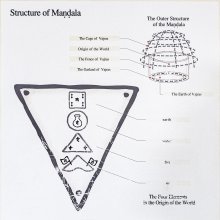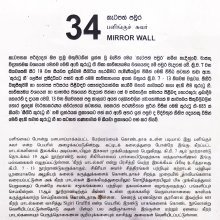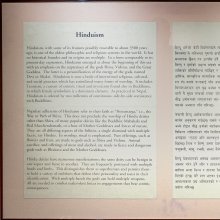Yukta: 25 definitions
Introduction:
Yukta means something in Hinduism, Sanskrit, Jainism, Prakrit, the history of ancient India, Marathi, Hindi, biology. If you want to know the exact meaning, history, etymology or English translation of this term then check out the descriptions on this page. Add your comment or reference to a book if you want to contribute to this summary article.
Alternative spellings of this word include Yukt.
Images (photo gallery)
In Hinduism
Purana and Itihasa (epic history)
Source: archive.org: Shiva Purana - English TranslationYukta (युक्त) refers to “being accompanied (by one’s maids)”, according to the Śivapurāṇa 2.3.30 (“The Celebration of Pārvatī’s Return”).—Accordingly, as Brahmā narrated to Nārada: “O dear, listen with pleasure to what happened thereafter when Śiva returned to His place. I shall mention it, remembering Śiva. Accompanied by her maids (sakhī-yukta) and assuming meaningful dress and features she returned to her father’s house repeating the name of lord Śiva. On hearing that Pārvatī was returning, Menā and Himavat excessively delighted went ahead seated in a divine vehicle. [...]”.
Source: Cologne Digital Sanskrit Dictionaries: The Purana Index1a) Yukta (युक्त).—A deva.*
- * Brahmāṇḍa-purāṇa II. 13. 94; Vāyu-purāṇa 31. 8.
1b) A son of Raivata Manu.*
- * Matsya-purāṇa 9. 21.
1c) A sage of the XIV epoch of Manu.*
- * Viṣṇu-purāṇa III. 2. 44.

The Purana (पुराण, purāṇas) refers to Sanskrit literature preserving ancient India’s vast cultural history, including historical legends, religious ceremonies, various arts and sciences. The eighteen mahapuranas total over 400,000 shlokas (metrical couplets) and date to at least several centuries BCE.
Vyakarana (Sanskrit grammar)
Source: Wikisource: A dictionary of Sanskrit grammarYukta (युक्त).—(l) proper, appropriate, justified; the word is very frequently used in the Mahabhasya and other grammar works; (2) the sense of the original base which is connected with the sense of the affix; cf. अथवा युक्तः प्रकृत्यर्थ (athavā yuktaḥ prakṛtyartha); प्रत्ययार्थेन संबद्धः (pratyayārthena saṃbaddhaḥ), Kas. on P. I. 2.51 ; (3) connected with; cf. उकारश्चेतिकरणेन युक्तः (ukāraścetikaraṇena yuktaḥ) R. Pr. I. 29; तथायुक्तं चानीप्सितम् (tathāyuktaṃ cānīpsitam) P. I. 4.50.

Vyakarana (व्याकरण, vyākaraṇa) refers to Sanskrit grammar and represents one of the six additional sciences (vedanga) to be studied along with the Vedas. Vyakarana concerns itself with the rules of Sanskrit grammar and linguistic analysis in order to establish the correct context of words and sentences.
Ayurveda (science of life)
Source: eJournal of Indian Medicine: Jajjaṭa’s Nirantarapadavyākhyā and Other Commentaries on the CarakasaṃhitāYuktā (युक्ता) (or Muktā) is a synonym of Rāsnā, which refers to a medicinal plant mentioned in the 7th-century Nirantarapadavyākhyā by Jejjaṭa (or Jajjaṭa): one of the earliest extant and, therefore, one of the most important commentaries on the Carakasaṃhitā.—Synonyms of Rāsnā: Rosanā, Vāyasuraī, Atirasā (?)[sic], Elāparṇī, Muktā (Yuktā), Surabhi; Pluchea lanceolata Oliver and Hiern.—(Cf. Glossary of Vegetable Drugs in Bṛhattrayī 337-338, Singh and Chunekar, 1999).—Pluchea lanceolata (DC.) C.B.Clarke.—(Cf. The Plant List, A Working List of All Plant Species, Royal Botanic Gardens, Kew and Missouri Botanical Garden).

Āyurveda (आयुर्वेद, ayurveda) is a branch of Indian science dealing with medicine, herbalism, taxology, anatomy, surgery, alchemy and related topics. Traditional practice of Āyurveda in ancient India dates back to at least the first millenium BC. Literature is commonly written in Sanskrit using various poetic metres.
Jyotisha (astronomy and astrology)
Source: Wisdom Library: Brihat Samhita by VarahamihiraYukta (युक्त) refers to “one who is learned (in the Śāstras)”, according to the Bṛhatsaṃhitā (chapter 15) (“On the nakṣatras—‘asterisms’”), an encyclopedic Sanskrit work written by Varāhamihira mainly focusing on the science of ancient Indian astronomy astronomy (Jyotiṣa).—Accordingly, “Those who are born on the lunar day of Hasta will be thieves, dealers in elephants, charioteers (rathika), chief ministers, painters, merchants and dealers in pod-grains; learned in the Śāstras (śruta-yukta) and of bright appearance. Those who are born on the lunar day of Citrā will be dealers in jewels, precious stones, fine cloths, writers and singers, manufacturers of perfumes, good mathematicians, weavers, surgeons, oculists and dealers in Rājadhānya. [...]”.

Jyotisha (ज्योतिष, jyotiṣa or jyotish) refers to ‘astronomy’ or “Vedic astrology” and represents the fifth of the six Vedangas (additional sciences to be studied along with the Vedas). Jyotisha concerns itself with the study and prediction of the movements of celestial bodies, in order to calculate the auspicious time for rituals and ceremonies.
Shaivism (Shaiva philosophy)
Source: Brill: Śaivism and the Tantric TraditionsYukta (युक्त) refers to “(one) united (with Divinity)”, as cited by Alaka in his commentary on the Haravijaya 6.137.—Accordingly, “Just as copper rubbed with mercury [becomes gold and] does not again become copper, in the same way one united (yukta) with Divinity does not again become a bound soul”.
Source: SOAS University of London: Protective Rites in the Netra TantraYukta (युक्त) refers to “(being) joined with”, according to the Netratantra of Kṣemarāja: a Śaiva text from the 9th century in which Śiva (Bhairava) teaches Pārvatī topics such as metaphysics, cosmology, and soteriology.—Accordingly, [verse 2.22cd-28ab]—“[...] That which is described is celebrated in the world as the supreme Amṛta [sa], this is the highest dwelling place. It is the highest Amṛta. Joined with the kalā nectar (yukta—pīyūṣakalayā yuktaṃ) [visarga], filled with the splendor of the moon. It is the highest abode [of Śiva]. That is the supreme word. That is supreme strength, that is supreme amṛta. The highest of splendors is highest light of light. [...]”.

Shaiva (शैव, śaiva) or Shaivism (śaivism) represents a tradition of Hinduism worshiping Shiva as the supreme being. Closely related to Shaktism, Shaiva literature includes a range of scriptures, including Tantras, while the root of this tradition may be traced back to the ancient Vedas.
Shaktism (Shakta philosophy)
Source: Google Books: Manthanabhairavatantram1) Yuktā (युक्ता) refers to “she who is endowed (with the consciousness of the Command)”, according to the Manthānabhairavatantra, a vast sprawling work that belongs to a corpus of Tantric texts concerned with the worship of the goddess Kubjikā.—Accordingly, “She who is KLĪṂ, the goddess Klinnā, accompanied by the Goddess and endowed with the consciousness of the Command (ājñācaitanya-yuktā) is Vakrā whose form is the Triangle. Supreme with (the sacred energy of the) nasal (letters in her Vidyā), she is Parā, the foremost knowledge. She has three eyes. (As) the Sun and Moon she shines as the Ray (of divine light), and is the goddess called Ciñciṇī. I praise her, she who residing in the Void, is the goddess whose eyes are the Sun and Moon and consists of thirty-two syllables”.
2) Yukta (युक्त) refers to “(being) conjoined (with the goddess)”, according to the Kularatnoddyota verse 2.21-27.—Accordingly, “[...] He worshipped the Great Transmission with hymns and excellent divine lauds, by exhibiting the Great Gestures and with salutations and the waving of lamps along with divine words of praise and rites of adoration centered on the maṇḍala and the Krama. Taking up then the energizing (substances), O fair one, he who does all things, was conjoined (yukta) with the goddess. O Supreme mistress, praised by the heroes, the Lord of the heroes and the universal Self took up the vessel with the meat and put it in (his) mouth along with the sacrificial pap. [...]”.

Shakta (शाक्त, śākta) or Shaktism (śāktism) represents a tradition of Hinduism where the Goddess (Devi) is revered and worshipped. Shakta literature includes a range of scriptures, including various Agamas and Tantras, although its roots may be traced back to the Vedas.
Pancaratra (worship of Nārāyaṇa)
Source: University of Vienna: Sudarśana's Worship at the Royal Court According to the AhirbudhnyasaṃhitāYukta (युक्त) refers to the “joining” (of various Yantras”, according to the Ahirbudhnyasaṃhitā, belonging to the Pāñcarātra tradition which deals with theology, rituals, iconography, narrative mythology and others.—Accordingly, “He who has the Yantra of Narasiṃha joined (yukta) with [that] of Sudarśana constructed shall conquer even the other world. Just by drawing this, men can attain everything”.

Pancaratra (पाञ्चरात्र, pāñcarātra) represents a tradition of Hinduism where Narayana is revered and worshipped. Closeley related to Vaishnavism, the Pancaratra literature includes various Agamas and tantras incorporating many Vaishnava philosophies.
In Jainism
General definition (in Jainism)
Source: The University of Sydney: A study of the Twelve ReflectionsYukta (युक्त) refers to “(being) connected with”, according to the 11th century Jñānārṇava, a treatise on Jain Yoga in roughly 2200 Sanskrit verses composed by Śubhacandra.—Accordingly, “Having assented to your own births in the forest of life, the pain you have been suffering previously for a long time by roaming about on the path of bad conduct subject to wrong faith [com.—mithyātva-yukta-durnītimārga-bhrānta—‘by the one wandering on the path of misconduct connected with wrong faith’] is [like] an external fire. Now, having entered the self which is cherishing the end of all restlessness, wise, solitary, supreme [and] self-abiding, may you behold the beautiful face of liberation. [Thus ends the reflection on] difference [between the body and the self]”.
Synonyms: Pratibaddha, Yuta.

Jainism is an Indian religion of Dharma whose doctrine revolves around harmlessness (ahimsa) towards every living being. The two major branches (Digambara and Svetambara) of Jainism stimulate self-control (or, shramana, ‘self-reliance’) and spiritual development through a path of peace for the soul to progess to the ultimate goal.
India history and geography
Source: Cologne Digital Sanskrit Dictionaries: Indian Epigraphical GlossaryYukta.—(EI 8-3; HD), an officer in general; also an offi- cial designation (CII, Vol. 1, p. 4); the word used in Rock Edict III of Aśoka is explained by some scholars as the designa- tion of a class of officers, although there also the word may be understood in the sense of ‘an officer’; but it is an official desig- nation in passages like yukta-niyukta-vāsāvaka-adhikārika (Ep. Ind., Vol. XXI, p. 144) where it may be the same as Āyuktaka. Cf. Yuktaka, Āyukta, etc. Note: yukta is defined in the “Indian epigraphical glossary” as it can be found on ancient inscriptions commonly written in Sanskrit, Prakrit or Dravidian languages.

The history of India traces the identification of countries, villages, towns and other regions of India, as well as mythology, zoology, royal dynasties, rulers, tribes, local festivities and traditions and regional languages. Ancient India enjoyed religious freedom and encourages the path of Dharma, a concept common to Buddhism, Hinduism, and Jainism.
Biology (plants and animals)
Source: Wisdom Library: Local Names of Plants and DrugsYukta [युक्ता] in the Sanskrit language is the name of a plant identified with Pluchea lanceolata (DC.) C.B.Clarke from the Asteraceae (Sunflower) family having the following synonyms: Berthelotia lanceolata. For the possible medicinal usage of yukta, you can check this page for potential sources and references, although be aware that any some or none of the side-effects may not be mentioned here, wether they be harmful or beneficial to health.
Source: Google Books: CRC World Dictionary (Regional names)Yukta in India is the name of a plant defined with Pluchea lanceolata in various botanical sources. This page contains potential references in Ayurveda, modern medicine, and other folk traditions or local practices It has the synonym Berthelotia lanceolata DC. (among others).
Example references for further research on medicinal uses or toxicity (see latin names for full list):
· Nouveau Bulletin des Sciences, Publie par la Société Philomatique de Paris (1817)
· Annals of the Missouri Botanical Garden (1994)
· Flora of Tropical Africa (1877)
· Prodromus Systematis Naturalis Regni Vegetabilis (1836)
· Ann. Cat. Vasc. Pl. W. Pakistan & Kashm. (1972)
· Flora of Iran (1980)
If you are looking for specific details regarding Yukta, for example health benefits, side effects, chemical composition, extract dosage, pregnancy safety, diet and recipes, have a look at these references.

This sections includes definitions from the five kingdoms of living things: Animals, Plants, Fungi, Protists and Monera. It will include both the official binomial nomenclature (scientific names usually in Latin) as well as regional spellings and variants.
Languages of India and abroad
Marathi-English dictionary
Source: DDSA: The Molesworth Marathi and English Dictionaryyukta (युक्त).—p (S) Joined, united, combined, connected, mingled with, lit. fig. 2 Endowed with, possessing. In these senses many useful compounds are formed; as cintāyukta, śōkayukta, saṃśayayukta, khēdayakta, harṣayukta, kāmayukta, lōbhayukta, bhayayukta, prītiyukta, jalayukta, śarkarāyukta. 3 Intent on or attached to (a study or pursuit); employed or engaged in (a business). 4 Occupied in the performance of yōga. 5 Suited or suitable, becoming, agreeing, fitting.
Source: DDSA: The Aryabhusan school dictionary, Marathi-Englishyukta (युक्त).—p United. Endowed with. Suitable. Intent on.
Marathi is an Indo-European language having over 70 million native speakers people in (predominantly) Maharashtra India. Marathi, like many other Indo-Aryan languages, evolved from early forms of Prakrit, which itself is a subset of Sanskrit, one of the most ancient languages of the world.
Sanskrit dictionary
Source: DDSA: The practical Sanskrit-English dictionaryYukta (युक्त).—p. p. [yuj-kta]
1) Joined, united.
2) Fastened, yoked, harnessed.
3) Fitted out, arranged; उदतिष्ठन् महाराज सर्वं युक्तमशेषतः (udatiṣṭhan mahārāja sarvaṃ yuktamaśeṣataḥ) Mahābhārata (Bombay) 6.16.4.
4) Accompanied; युक्तः प्रमाद्यसि (yuktaḥ pramādyasi) Kirātārjunīya 11.29.
5) Furnished or endowed with, filled with, having, possessing (with instr. or in comp.)
6) Fixed or intent on, absorbed or engaged in, devoted to (with loc.); कौसल्यायां यथा युक्तो जनन्यां वर्तते सदा (kausalyāyāṃ yathā yukto jananyāṃ vartate sadā) Rām.2.2.3; युक्तः प्रजानामनुरञ्जने स्याः (yuktaḥ prajānāmanurañjane syāḥ) Uttararāmacarita 1.11; Pañcatantra (Bombay) 1.284.
7) Used, employed.
8) Adapted, fitted.
9) Appointed (a government servant); अपि शक्या गतिर्ज्ञातुं पततां खे पतत्रिणाम् । न तु प्रच्छन्नभावानां युक्तानां चरतां गतिः ॥ मत्स्या यथान्तःसलिले चरन्तो ज्ञातुं न शक्याः सलिलं पिवन्तः । युक्ता- स्तथा कार्यविधौ नियुक्ता ज्ञातुं न शक्या धनमाददानाः (api śakyā gatirjñātuṃ patatāṃ khe patatriṇām | na tu pracchannabhāvānāṃ yuktānāṃ caratāṃ gatiḥ || matsyā yathāntaḥsalile caranto jñātuṃ na śakyāḥ salilaṃ pivantaḥ | yuktā- stathā kāryavidhau niyuktā jñātuṃ na śakyā dhanamādadānāḥ) || Kau. A.2.9.
1) Connected with.
11) Proved, inferred,
12) Active, diligent.
13) Skilful, experienced, clever; सुग्रीवमन्त्रिते युक्तौ मम चापि हिते रतौ (sugrīvamantrite yuktau mama cāpi hite ratau) Rām.7.39.18.
14) Fit, proper, right, suitable (with gen. or loc).
15) Primitive, not derived (from another word).
16) = योग- युक्त (yoga- yukta) q. v.; अनिःश्वसन्तं युक्तं तम् (aniḥśvasantaṃ yuktaṃ tam) Rām.7.16.16; cf. युक्तचेतस् (yuktacetas).
17) = नियमवान् (niyamavān); श्रद्दधानः सदा युक्तः सदा धर्मपरायणः (śraddadhānaḥ sadā yuktaḥ sadā dharmaparāyaṇaḥ) Mahābhārata (Bombay) 1. 1.261.
18) (In astr.) Being in conjunction with.
-ktaḥ 1 A saint who has become one with the Supreme Spirit.
-ktam 1 A team, yoke.
2) Money lawfully obtained.
3) Junction, connection.
4) Fitness, propriety.
-ktam ind. Fitly, properly, justly, duly, well.
Source: Cologne Digital Sanskrit Dictionaries: Shabda-Sagara Sanskrit-English DictionaryYukta (युक्त).—mfn.
(-ktaḥ-ktā-ktaṃ) 1. Joined, combined, united, identified. 2. Right, fit, proper. 3. Proved, concluded by inference or argument. 4. Moderate, limited. 5. Possessing, endowed with, as virtues, qualities, &c. 6. Intent on, attached to, as a study or pursuit. 7. Employed or engaged in business, &c. 8. Occupied in performance of the religious exercise called Yoga. m.
(-ktaḥ) The sage who has acquired the command of his feelings and passions, and who performs the customary devotional offices without any regard to their result. n.
(-ktaṃ) 1. A measure of four cubits. 2. A team, a yoke. f.
(-ktā) A plant, commonly Elani. E. yuj to join or mix, aff. kta .
Source: Cologne Digital Sanskrit Dictionaries: Cappeller Sanskrit-English DictionaryYukta (युक्त).—[adjective] yoked, harnessed, set to work, appointed, instituted, occupied with, ([locative] or —°); active, zealous, attentive, concentrated, absorbed in thought; skilful, clever in ([locative]), joined or furnished with; accompanied by ([instrumental] or —°) relating to, dependent on (—°); fit, proper, right to ([with] yad or infin.).
Source: Cologne Digital Sanskrit Dictionaries: Monier-Williams Sanskrit-English Dictionary1) Yukta (युक्त):—a yukti etc. See [columns] 2, 3.
2) [from yuj] b mfn. yoked or joined or fastened or attached or harnessed to ([locative case] or [instrumental case]), [Ṛg-veda] etc. etc.
3) [v.s. ...] set to work, made use of, employed, occupied with, engaged in, intent upon ([instrumental case] [locative case] or [compound]), [ib.]
4) [v.s. ...] ready to, prepared for ([dative case]), [Mahābhārata]
5) [v.s. ...] absorbed in abstract meditation, concentrated, attentive, [Ṛg-veda] etc. etc.
6) [v.s. ...] skilful, clever, experienced in, familiar with ([locative case]), [Mahābhārata; Rāmāyaṇa]
7) [v.s. ...] joined, united, connected, combined, following in regular succession, [Ṛg-veda; Śāṅkhāyana-śrauta-sūtra; Varāha-mihira; Bhāgavata-purāṇa] (am ind. in troops, [Śatapatha-brāhmaṇa])
8) [v.s. ...] furnished or endowed or filled or supplied or provided with, accompanied by, possessed of ([instrumental case] or [compound]), [Manu-smṛti; Mahābhārata] etc.
9) [v.s. ...] come in contact with ([instrumental case]), [Rāmāyaṇa]
10) [v.s. ...] (in [astronomy]) being in conjunction with ([instrumental case]), [Āśvalāyana-gṛhya-sūtra]
11) [v.s. ...] (ifc.) added to, increased by (e.g. catur-yuktā viṃśatiḥ, twenty increased by four id est. 24), [Varāha-mihira’s Bṛhat-saṃhitā]
12) [v.s. ...] (ifc.) connected with, concerning, [Kātyāyana-śrauta-sūtra]
13) [v.s. ...] (ifc.) subject to, dependent on [Mahābhārata]
14) [v.s. ...] fitted, adapted, conforming or adapting one’s self to, making use of ([instrumental case] e.g. yuktaḥ kālena yaḥ, one who makes use of the right opportunity), [Kāmandakīya-nītisāra]
15) [v.s. ...] fit, suitable, appropriate, proper, right, established, proved, just, due, becoming to or suitable for ([genitive case] [locative case] or [compound], e.g. āyati-yukta, suitable for the future; or [in the beginning of a compound] See below; yuktam with yad or an [infinitive mood] = it is fit or suitable that or to; na yuktam bhavatā, it is not seemly for you), [Manu-smṛti; Mahābhārata] etc.
16) [v.s. ...] auspicious, favourable (as fate, time etc.), [Manu-smṛti; Rāmāyaṇa]
17) [v.s. ...] prosperous, thriving, [Rāmāyaṇa]
18) [v.s. ...] (with tathā) faring or acting thus, [Mahābhārata]
19) [v.s. ...] (in gram.) primitive (as opp. to ‘derivative’), [Pāṇini 1-2, 51]
20) [v.s. ...] m. Name of a son of Manu Raivata, [Harivaṃśa]
21) [v.s. ...] of a Ṛṣi under Manu Bhautya, [ib.]
22) Yuktā (युक्ता):—[from yukta > yuj] f. Name of a plant, [cf. Lexicographers, esp. such as amarasiṃha, halāyudha, hemacandra, etc.] (cf. yukta-rasā)
23) Yukta (युक्त):—[from yuj] n. a team, yoke, [Śatapatha-brāhmaṇa]
24) [v.s. ...] junction, connection, [Pāṇini 2-3, 4; 8 etc.]
25) [v.s. ...] fitness, suitableness, propriety (am ind. fitly, suitably, justly, properly, rightly; ena, properly, suitably, [Ṛg-veda v, 27, 3]; buddhi-yuktena, conformably to reason, [Rājataraṅgiṇī])
Source: Cologne Digital Sanskrit Dictionaries: Yates Sanskrit-English DictionaryYukta (युक्त):—[(ktaḥ-ktā-ktaṃ) a.] Joined; proved; possessed of, engaged in; fit, right. m. A perfect ascetic. f. A plant. n. Measure of 4 cubits.
Source: DDSA: Paia-sadda-mahannavo; a comprehensive Prakrit Hindi dictionary (S)Yukta (युक्त) in the Sanskrit language is related to the Prakrit word: Jutta.
[Sanskrit to German]
Sanskrit, also spelled संस्कृतम् (saṃskṛtam), is an ancient language of India commonly seen as the grandmother of the Indo-European language family (even English!). Closely allied with Prakrit and Pali, Sanskrit is more exhaustive in both grammar and terms and has the most extensive collection of literature in the world, greatly surpassing its sister-languages Greek and Latin.
Hindi dictionary
Source: DDSA: A practical Hindi-English dictionaryYukta (युक्त) [Also spelled yukt]:—(a) united, combined; joined with; fitted with; befitting, suitable; proper, right; ~[ka] jointer; ~[tama] optimum; ~[tā] fittingness, suitable; propriety.
...
Kannada-English dictionary
Source: Alar: Kannada-English corpusYukta (ಯುಕ್ತ):—
1) [adjective] joined; united.
2) [adjective] got; received; acquired; obtained.
3) [adjective] that suits a given purpose, occasion, condition, propriety, etc.; fitting; appropriate; apt; suitable.
4) [adjective] absorbed, engrossed in; deeply interested and involved in.
5) [adjective] according to the principles of logic or correct reasoning.
--- OR ---
Yukta (ಯುಕ್ತ):—
1) [noun] that which is fit, proper, suitable.
2) [noun] a suitable, appropriate man.
3) [noun] a man having the mystic power by which he knows the happenings in the past, present and future.
4) [noun] (rhet.) a kind of figure of speech.
5) [noun] (math.) an adding of two or more numbers into one sum; addition.
Kannada is a Dravidian language (as opposed to the Indo-European language family) mainly spoken in the southwestern region of India.
See also (Relevant definitions)
Starts with (+31): Yuktabhavadeva, Yuktaceshta, Yuktacetas, Yuktacetasa, Yuktacheshta, Yuktachetas, Yuktadanda, Yuktadandata, Yuktagai, Yuktagravan, Yuktahara, Yuktaharavihara, Yuktahari, Yuktaka, Yuktakarin, Yuktakarman, Yuktakarmata, Yuktakrit, Yuktam, Yuktamada.
Ends with (+262): Abharanasamyukta, Abharanayukta, Abhidharmasamyukta, Abhiniyukta, Abhisamayukta, Abhisamyukta, Abhiyukta, Abhyasayukta, Abhyukta, Abhyupayukta, Adhikaraprayukta, Adhiyukta, Adhyavasayayukta, Aguruprayukta, Ahiyukta, Ahomasamyukta, Ajnacaitanyayukta, Ajnayukta, Akaryaprayukta, Amedhyayukta.
Full-text (+412): Jutta, Yuktarasa, Vipattiyukta, Nityayukta, Amedhyayukta, Gunayukta, Yuktamanas, Yuktayas, Yuktavadin, Ayuktam, Kshamayukta, Trapayukta, Yuktam, Yathayuktam, Samyuktam, Viyukta, Niyuktam, Dayayukta, Tvarayukta, Shraddhayukta.
Relevant text
Search found 118 books and stories containing Yukta, Yuktā; (plurals include: Yuktas, Yuktās). You can also click to the full overview containing English textual excerpts. Below are direct links for the most relevant articles:
Garga Samhita (English) (by Danavir Goswami)
Verse 2.16.14 < [Chapter 16 - The Worship of Tulasī]
Verses 2.18.31-32 < [Chapter 18 - The Sight of Śrī Kṛṣṇacandra]
Verse 2.20.23 < [Chapter 20 - The Rāsa-dance Pastime]
Shrimad Bhagavad-gita (by Narayana Gosvami)
Verse 2.51 < [Chapter 2 - Sāṅkhya-yoga (Yoga through distinguishing the Soul from the Body)]
Verse 7.22 < [Chapter 7 - Vijñāna-Yoga (Yoga through Realization of Transcendental Knowledge)]
Verse 9.14 < [Chapter 9 - Rāja-guhya-yoga (Yoga through the most Confidential Knowledge)]
Rig Veda (translation and commentary) (by H. H. Wilson)
Chaitanya Bhagavata (by Bhumipati Dāsa)
Verse 1.1.154 < [Chapter 1 - Summary of Lord Gaura’s Pastimes]
Verse 2.7.99 < [Chapter 7 - The Meeting of Gadādhara and Puṇḍarīka]
Verse 2.24.92 < [Chapter 24 - The Lord Displays His Universal Form to Advaita]
Vakyapadiya of Bhartrihari (by K. A. Subramania Iyer)
Verse 1.9 < [Book 1 - Brahma-kāṇḍa (or Āgama-samuccaya)]
Verse 3.14.50 < [Book 3 - Pada-kāṇḍa (14): Vṛtti-samuddeśa (On Ccomplex Formation)]
Verse 3.14.51 < [Book 3 - Pada-kāṇḍa (14): Vṛtti-samuddeśa (On Ccomplex Formation)]
Brihad Bhagavatamrita (commentary) (by Śrī Śrīmad Bhaktivedānta Nārāyana Gosvāmī Mahārāja)
Verse 2.4.149-150 < [Chapter 4 - Vaikuṇṭha (the spiritual world)]
Verse 2.4.254 < [Chapter 4 - Vaikuṇṭha (the spiritual world)]
Verse 2.4.104 < [Chapter 4 - Vaikuṇṭha (the spiritual world)]
Related products











